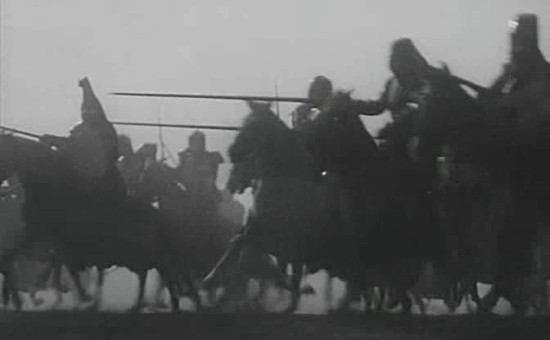
One wonders what Shakespeare's intent was in creating Falstaff. Was he meant simply to be an agent of Prince Hal's indiscretions, to add tension to the Henry IV plays as to whether or not Hal would prove a worthy heir to the crown? Or did Shakespeare quite intend Falstaff to be as he is, a counter current of genuine human insight in the polarised sequence of larger than life figures, beginning with the villainous Richard II to the honourable two King Henrys? Which is not to say, of course, that those kings are weakly conceived characters. They're men devoted to hard ideals while Falstaff is not, paradoxically drawing our admiration more, or at least our respect. When he thinks he sees Falstaff has died (though the big knight is of course only effecting a "counterfeit" of death), Hal says, "I could have better spar'd a better man." This is perhaps more clearly true in Orson Welles' 1966 film Chimes at Midnight than in any other adaptaion. In this film, Welles brilliantly blends five of Shakespeare's plays to tell the story of Falstaff and his relationship with Prince Hal. This is by no means the definitive take on Falstaff, which is just as well, as it forms only a part of a universe of adaptations and takes on the character. What Welles presents here is a tightly focused tale of a man choosing between two fathers, in so doing choosing between two conceptions of human existence.

Just before the Battle of Shrewsbury, when Hal and his father, the king, have gathered forces for the conflict--among whom is Falstaff with a motley retinue--there is this famous exchange between the Prince and Falstaff;
PRINCE: Why, thou owest God a death.
FALSTAFF: 'Tis not due yet. I would be loath to pay him before his day. What need I be so forward with him that calls not on me? Well, 'tis no matter; honour pricks me on. Yea, but how if honour prick me off when I come on? How then? Can honour set to a leg? No. Or an arm? No. Or take away the grief of a wound? No. Honour hath no skill in surgery then? No. What is honour? A word. What is that word honour? Air. A trim reckoning! Who hath it? He that died a Wednesday. Doth he feel it? No. Doth be bear it? No. 'Tis insensible then? Yea, to the dead. But will it not live with the living? No. Why? Detraction will not suffer it. Therefore I'll none of it. Honour is a mere scutcheon- and so ends my catechism.
Reading the play, it's difficult to get a feel for the horrors of the battlefield. Mostly it becomes a comic scene with Falstaff's dialogue, though it's as though Shakespeare had in mind a production that could adequately convey the monstrousness of battle because Falstaff's humorous lines have in them the resonance of a real insight into the hopelessness of human conflict. Welles brings this contrast into brilliant life with the most famous scene in Chimes of Midnight, one of the best conceived medieval battle sequences, one of the best battle sequences, in the history of cinema.

He only had 180 extras but Welles made it look like thousands with composition and editing. He gets a few crane shots of knights with lances galloping towards one another but mostly the camera is low amongst the confusion of men and horses frantically slaughtering one another in the mud. Every time we see maces coming down on men, swords being driven through chests, the camera rarely focuses on it, they zip by in the camera's dizzy journey about the field, or we get caught on men relentlessly bludgeoning a helpless man or horse into the mud. Welles gets a lot of traction in the span of about four seconds from this white horse;

We first see it falling to the ground in the direction of the camera's violent swish to the right, then we see it struggling back up before Welles cuts away, then comes back to the horse as it's walking backwards in terror.

Somehow Welles finds a rhythm in these shots that pieces together the right sense of quick snatches of points of view from people and animals. Meanwhile we see Falstaff wandering on the outskirts in a massive suit of armour like an astronaut on the moon.

And suddenly he looks like the only sane man around and the king represents a player in a sick, mutually agreed upon delusion.

John Gielgud plays the king with an appropriate gravity; "Uneasy lies the head that wears a crown" indeed. Consumed with the implications of his actions in terms of honour and morality, here is a man tragically pricked. Welles himself plays Falstaff, the opposite of the king.

It's hard to imagine anyone better suited for the role, as many have said. In addition to suiting the character physically, Welles gives the character the right amount of animalistic majesty without ever being maudlin. He sets the newly crowned Henry V's rejection of Falstaff in a silent, echoing chamber filled with people bearing witness to the coronation. Welles' face is heartbreaking as the new king tells him that their friendship essentially meant nothing as it is the same as essentially saying the humanity Falstaff represents meant nothing. Hal becomes one of the "better men".

Twitter Sonnet #475
The green hat forgotten spikes memory.
Flat arms in fours bring luck to white meadow.
Dandelion hair plugs, spring's usury;
Sundials wilt in five o'clock shadow.
Invisible diapers hold the wise poop.
Charcoal fur makes Chia diamonds in space.
Ethereal hirsute stars spoil soup.
The luck of black holes makes all hands an ace.
Quantum mechanics won't help you lose weight.
Haystacks frighten scarecrows with torture porn.
Peppermint is the leg's striped gastric bait.
Close-ups show mugs of barmy bristles shorn.
Pop-O-Matic Agincourt bloodshed crashed
Software withered by agéd green hearts dashed.

No comments:
Post a Comment